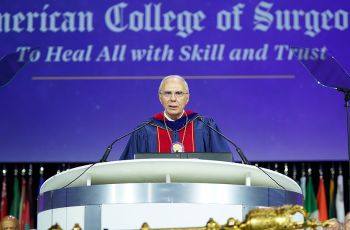Sweltering temperatures aren’t just uncomfortable; they’re bad for your health. Extreme heat puts tremendous stress on your body and can lead to dehydration, heat exhaustion, and heatstroke, among other health-related consequences. Here, Neelima Tummala, MD, a board-certified physician in the Division of Otolaryngology at the George Washington University (GW) Medical Faculty Associates (MFA), takes us through the impact of severely hot weather, how it relates to climate change, and why some populations are more vulnerable to extreme heat than others.
How has climate change affected heat and humidity?
Tummala: Climate change is contributing to more frequent extreme heat events. This is something that people around the globe have endured this summer, from heat extremes in India and Pakistan to record heat across much of Europe and the United States.
According to the sixth assessment of the Intergovernmental Panel on Climate Change report, an extreme heat event that would have occurred once every 10 years in the absence of global warming, is expected to happen about four times a decade with 1.5 degrees Celsius of warming. The more warming that occurs, the more heat extreme events we can expect. For example, the report shows that an extreme heat event that would have happened once every 50 years in the absence of global warming, is expected to occur almost 14 times as often in the future with 2 degrees Celsius of warming. Thus, the pattern shows that one of the major ways climate change has an impact on weather events, such as extreme heat, is by increasing the frequency with which these events occur.
Which populations are disproportionately affected by increased heat?
Tummala: In the United States, one population disproportionately affected by extreme heat is urban communities of color. Communities that were impacted by historically racist housing practices, including being divested due to redlining or discriminatory withholding of services, are to this day some of the hottest regions in the United States. Multiple factors contribute to these urban areas being hotter, including a lack of shade-providing green space and increased concrete and asphalt from the surrounding buildings and roads, which retain heat. One study showed that in 97% of cities, communities of color were exposed to higher temperatures than communities composed of mostly non-Hispanic white people.
What health problems can result from extreme heat?
Tummala: Extreme heat is the greatest weather-related cause of death. The health problems of prolonged heat exposure are widespread and can vary based on a person’s age and underlying health conditions. For the elderly, extended periods of heat exposure increase physiologic stress on the body. Heat makes the body work harder, which can put a strain on the cardiovascular system and increase the risk of a heart attack or stroke. For children, heat mixes with some air pollutants to create ground-level ozone (also known as smog). Breathing this polluted air increases the risk of respiratory complications, especially for children with asthma. In addition, student athletes who are playing outdoors for extended periods of time and are not carefully monitored are at risk of developing a heat-related illness, including heat cramps, heat exhaustion, and even heat stroke. For outdoor workers, such as those in construction or agriculture, extended periods of time working outside puts them at risk for a heat-related illness. In addition, when workers are not drinking enough water, there is a risk of dehydration and developing subsequent kidney disease.
What can people do to limit exposure to heat?
Tummala: The safest way to protect yourself and your loved ones from extreme heat is to prepare for it. Make sure to drink plenty of water, avoid going out during the hottest part of the day, wear sunscreen, and seek shade when possible. There are many free indoor activities in Washington, D.C. to plan for during the hottest parts of the day, including going to the library, walking around a museum, or visiting a DC Department of Parks and Recreation indoor pool.
To make an appointment with a physician, visit the GW MFA Ear, Nose, and Throat Center or GW Primary Care and call 202-741-3000.




